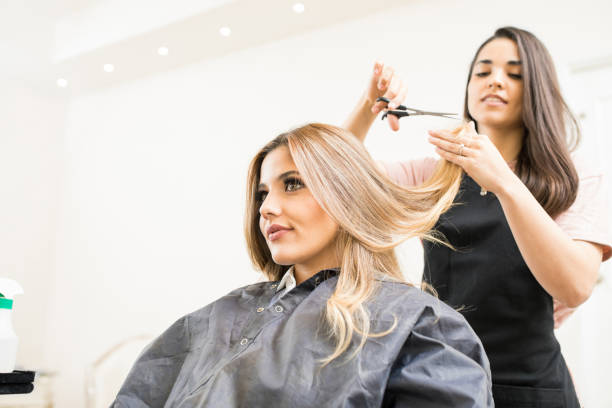
• 83m Americans are more likely to discuss their worries with their stylist or barber than a professional therapist, reveals poll
• Women, younger adults, Midwesterners and Hispanics most likely of all
• Are stylists and barbers the nation’s “barefoot therapists” – helping bridge the “therapy gap” and combat our mental health crisis?
One in three Americans (32%) are more likely to discuss their worries with the person who cuts their hair than with a professional therapist, reveals a new poll.
Women, younger adults, Midwesterners and Hispanics are most likely of all to do so, according to the survey of 1,005 Americans by pollsters iPsos eNation, on behalf of AQ, a new anxiety management app that tracks your anxiety in real-time.
“Millions of Americans suffer anxiety, depression and similar challenges but can’t afford to consult a professional therapist,” says Dr. Shaun Nanavati, neuropsychologist and Chief Science Officer of AQ.
“Others might have the money but not the time – or the inclination to do so, sometimes due to a lingering sense of stigma.” And even if they do have the time, money and inclination, says Dr. Nanavati, there just aren’t enough trained therapists to meet the overwhelming need.
“AQ empowers you to become your own therapist,” says Dr. Nanavati. It tracks your anxiety levels and mental state in real-time and then gives you real-time measures to manage them better.
Hair stylists and barbers, meanwhile, seem to be helping bridge “the therapy gap” in a different, less data-driven way than AQ, by acting as America’s unofficial “barefoot therapists”.
“They are paid for their cutting and styling skills,” says Dr. Nanavati, “but our poll confirms that many also spend their days listening to the troubles of their clients and acting as what amounts to informal and untrained therapists or counsellors.
“Whether we like it or not, the folks cutting our hair are already in the front line of today’s mental health crisis,” he adds. “You might call them park-bench – or, salon- or barber-chair – therapists.”
Stylists and barbers, of course, lack the training and qualifications to tackle many of the issues that trained therapists do, stresses Dr. Nanavati. “And yet some of their clients may feel more relaxed, trusting and open with them than they would with a trained therapist.”
The 32% of respondents to AQ’s poll who agree, either “somewhat” or “strongly”, with the statement that “I am more likely to discuss my worries with the person who cuts my hair than I am with a professional therapist” is the equivalent of 83 million adult Americans.
Of the remaining respondents, some two-fifths (42%) disagree with the statement, while the remainder neither agree nor disagree.
Women (35%), finds the poll, are more likely than men (29%) to prefer telling their worries to the person cutting their hair, while those aged 18-34 (37%) are more likely to do so than their elders.
Midwesterners (37%) are more likely to do so than those in any other region – and strikingly more likely so than Northeasterners (22%).
“Could this be because there are more therapists to see in the North-East and maybe also less residual stigma about consulting one?”, asks Dr. Nanavati.
Hispanics (40%) are the ethnic group most likely to prefer sharing their problems with the person cutting their hair, while “White (non-Hispanic)” (29%) are least likely to do so.
Those with children at home are more likely than those without to prefer sharing their worries with their stylist or barber – by a margin of 37 to 30%.

The AQ app empowers you to become your own therapist by collecting your real-time vitals – including some 15 heart-rate readings an hour, taken on average every four minutes – from your Apple Watch throughout your day and applying its proprietary technology, based on research by top scientists, to determine your mental state at all times.
AQ not only tracks your anxiety levels in real time but also offers proven measures to help you lower your anxiety in real time.
These range from CBT (Cognitive Behavioral Therapy) exercises to mindfulness and meditations, guided training and nature sounds, while the app’s “SOS Library” features over a dozen short exercises to provide immediate stress relief.
•
Notes for Editors
Methodology: All figures, unless otherwise stated, are from Ipsos eNation. Respondents were asked the question: How much do you agree or disagree with the following statement? “I am more likely to discuss my worries with the person who cuts my hair than I am with a professional therapist”. Total sample size was 1,005 U.S. adults in a nationally representative online survey. Fieldwork was undertaken online between April 24-25th, 2023.
• Figures for how many millions of Americans are more likely to discuss their worries with the person who cuts their hair than with a therapist were calculated by taking the percentage of poll respondents who had felt that particular anxiety and applying it to the total number of U.S. adults, age 18+ (258.3M) in the last U.S. Census (2020).
•••
ABOUT AQ: AQ is the world’s first app that tracks and measures your anxiety and mental health in real time – and provides targeted, real-time advice and treatments to manage your anxiety and improve your mental health and performance. Created by Mindwell Labs, AQ is your 24/7 personal mental health coach, in your pocket. AQ’s patent-pending proprietary technology and AI analyze your vitals collected by your Apple Watch in real-time throughout the day to help you understand what in your life makes you anxious or calm. AQ uses your mental health profile to provide you with personalized care based on your specific needs. You currently need an Apple Watch to use AQ but will soon be able to use any smartwatch.
AQ is available for free download on the App Store; try the premium version, with full personalization and all features, totally free for 14 days; pay $39.99/year or $4.99/month afterwards.



